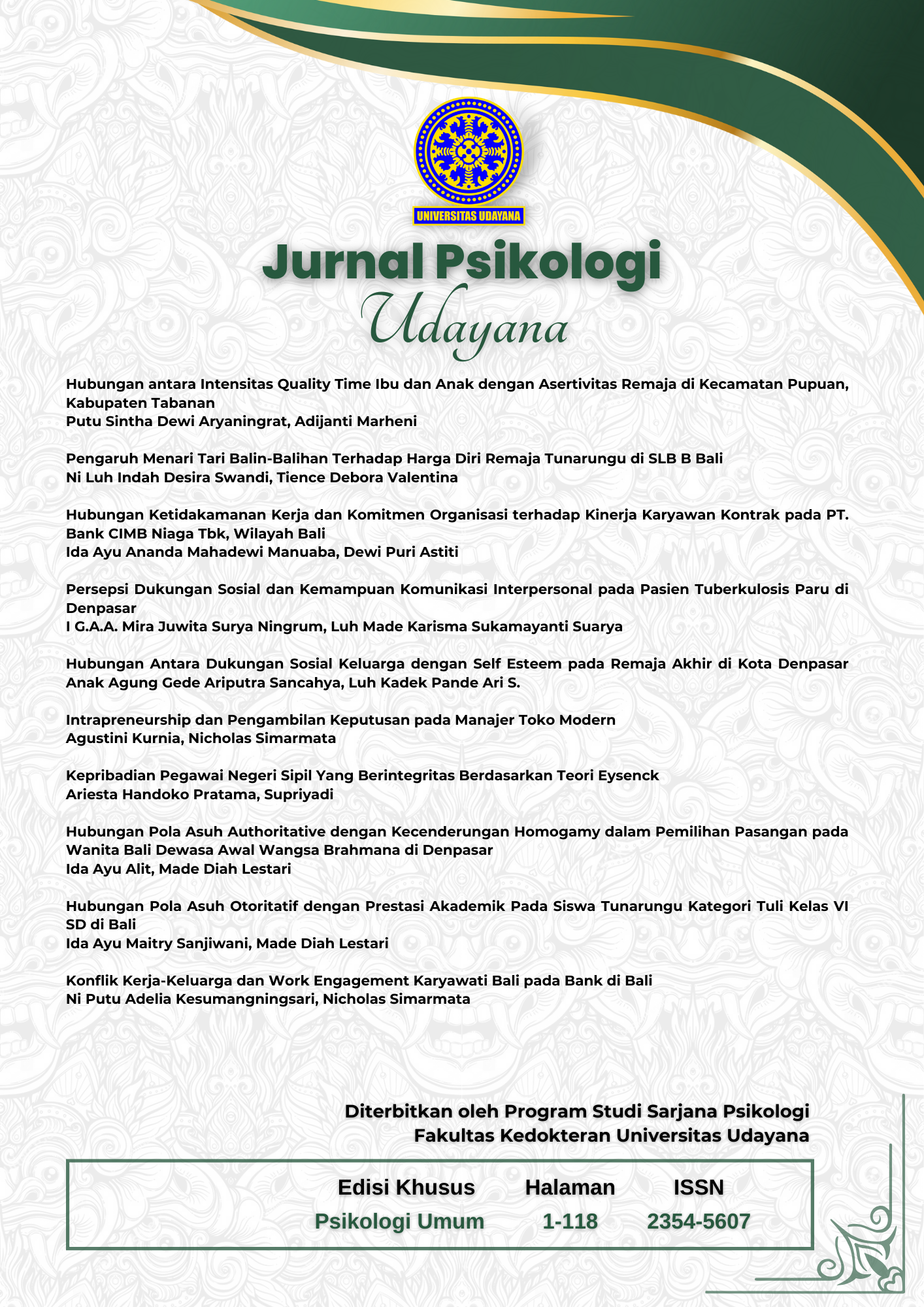HUBUNGAN POLA ASUH AUTHORITATIVE DENGAN KECENDERUNGAN HOMOGAMY DALAM PEMILIHAN PASANGAN PADA WANITA BALI DEWASA AWAL WANGSA BRAHMANA DI DENPASAR
Abstract
In Bali, partner selection remains an important issue since it is still influenced by a cultural factor that is the existence of the catur wangsa (four-caste) system. Wangsa has means descendant. Catur wangsa (four castes) are divided into four, namely Brahmin, Kshatriya, Vaishya and Shudra. Balinese women who occupy the top caste that is Brahmin would be more selective in choosing a partner for fear of their family’s attitude towards them if they are nyerod, meaning having a marriage where the wangsa (caste) of the woman is higher than that of her partner. The parenting styles applied by parents have a role in decision making when individuals choose their partners. Authoritative parenting style is an effective parenting style because it applies stability properly between acceptance/responsiveness and demandingness/control.
This study aims to determine the relationship between authoritative parenting style and the tendency of homogamy in partner selection by young adult women from the Brahmin caste. The subjects used in this study were women from the Brahmin caste, aged 20 to 30 years old, unmarried, and residing in Denpasar. The number of subjects used was as 60 people.
The authoritative-parenting-scale reliability was 0.939 and the tendency-of-homogamy-in-partner-selection-scale reliability was 0.948 . The result of the normality test on the authoritative parenting was 0.899 and the result of the normality test on the tendency of homogamy in partner selection was 0.199. The linearity test result on the authoritative parenting towards the tendency of homogamy in partner selection was 0.000.
The analytical methods used was the product moment correlation analysis. The correlation result in this study was 0.575 (p=0.000). Based on these results, it was found out that there is a relationship between authoritative parenting and the tendency of homogamy in partner selection by young adult women from the Brahmin caste in Denpasar.
Keywords: Autoritative Parenting, Homogamy, Partner Selection, Balinese Women, Brahmin Wangsa (Caste)
Downloads
References
Degenova, M.K. (2008). Intimate relationships, marriages & families. New York: The Mc Graw – Hill Companies.
Hergenhahn, B.R. (2009). An introduction to the history of psychology. Australia: Wadsworth Cengage Learning.
Hurlock, E.B. (1980). Psikologi perkembangan: suatu pendekatan sepanjang rentang kehidupan. Jakarta: Penerbit Erlangga.
Olson, D.H., & DeFrain, J. (2003). Marriages and families: intimacy, strengths, and diversity (ed.4). New York: McGraw-Hill.
Papalia, D.E., Olds, S.W.,& Feldman, R.D. (2009). Human development : perkembangan manusia (ed.10). Jakarta: Salemba Humanika.
Putra, I.D.G.U., dkk. (2013). Dinamika psikologis perempuan bali triwangsa dalam pemilihan pasangan. Naskah tidak dipublikasikan, Program Studi Psikologi, Fakultas Kedokteran, Universitas Udayana, Denpasar.
Santrock, J.W. (2007). Perkembangan anak. Jakarta. Erlangga.
Sigelman, C., & Rider, E. (2011). Life-span human development (ed.7). United States: Wadsworth Cengage Learning
Sugiyono. (2009). Metode penelitian kuantitatif dan kualitatif. Bandung: CV Alfabeta.
Sugiyono. (2010). Statistika untuk penelitian. Bandung: CV Alfabeta.
Wiana, I.K. (2006). Memahami perbedaan catur varna, kasta, dan wangsa. Surabaya. Penerbit Paramita.
Wira, I.M. (2011, Oktober). Sistem kasta di bali. Imadewira. Diakses dari http://www.imadewira.com/sistem-kasta-di-bali/ tanggal 21 Oktober 2013.
Authors who publish with this journal agree to the following terms:
- Authors retain copyright and grant the journal right of first publication with the work simultaneously licensed under a Creative Commons Attribution-ShareAlike 4.0 International License that allows others to share the work with an acknowledgement of the works authorship and initial publication in this journal.
- Authors are able to enter into separate, additional contractual arrangements for the non-exclusive distribution of the journals published version of the work (e.g., post it to an institutional repository or publish it in a book), with an acknowledgement of its initial publication in this journal.
- Authors are permitted and encouraged to post their work online (e.g., in institutional repositories or on their website) prior to and during the submission process, as it can lead to productive exchanges, as well as earlier and greater citation of published work (See The Effect of Open Access).













